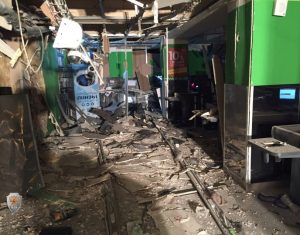
BEIRUT (Reuters) – An emergency aid convoy crossed front lines into the besieged rebel enclave of eastern Ghouta and delivered its supplies on Friday, braving shellfire and air strikes in the area amid a fierce government offensive.
The 13 food trucks unloaded all their food aid in the town of Douma and returned to government-held territory despite fighting which the International Committee of the Red Cross (ICRC) said came “extremely close” to the convoy.
In less than two weeks, the Syrian army has retaken nearly all the farmland in eastern Ghouta under cover of near ceaseless shelling and air strikes, leaving only a dense sprawl of towns – about half the territory – still under insurgent control.
The onslaught has killed more than 1,000 people, the medical charity Medecins Sans Frontieres (MSF) said on Thursday. The war monitor, the Syrian Observatory for Human Rights, on Friday gave a death toll of 950 civilians in the campaign.
For eastern Ghouta’s civilians, trapped in underground shelters but deprived of food and water, there is a constant dilemma – whether to seek supplies or stay inside.
“People were hopeful after the bombardment decreased and went out onto the streets. But then air strikes began again, and there are still people under the rubble that we couldn’t get out,” said Moayad al-Hafi, a man in the town of Saqba.
Damascus and its main ally Moscow have both said the assault is needed to stop rebel shelling of the nearby capital Damascus and end the rule of Islamist insurgents over civilians in eastern Ghouta, where some 400,000 people live.
But U.N. human rights chief Zeid Ra’ad al-Hussein has said, in comments criticized by Syria’s government, that the assault was “legally, and morally, unsustainable”.
There was a pause in the government’s bombardment overnight, but it soon resumed air strikes and shelling after the convoy carrying food parcels crossed into eastern Ghouta, according to residents and the Observatory.
Syrian state television and a witness later said bullets and mortars were fired from inside the rebel enclave at the al-Wafideen crossing point, through which the convoy had entered eastern Ghouta.
“Shelling in proximity of Douma (in) eastern Ghouta today is putting the…convoy at risk,” U.N. resident coordinator Ali al-Za’tari said in a statement.
The fighting had resurged, he added, “despite assurances of safety from parties including the Russian Federation”.
Robert Mardini, the ICRC’s Middle East director, said in a statement: “We were taken aback by the fighting that broke out despite guarantees.”
A Douma resident, in a voice message over which loud explosions were audible, said four jets were in the sky and residential areas had come under air attack.
The food was supposed to be delivered on Monday when another aid convoy entered Douma, but fighting forced it to leave early without unloading everything.
The 2,400 food parcels delivered can sustain 12,000 people for one month, and 3,248 wheat flour bags were also unloaded, according to the ICRC.
Defeat in eastern Ghouta would deal the rebels their biggest blow since the fall of Aleppo – Syria’s second city – in December 2016 by forcing them from their only big stronghold near Syria’s capital.
For President Bashar al-Assad, it would mark a victory as he builds on the military momentum created by Russia’s 2015 entry into the war, which has restored his rule over swathes of Syria.
In many cases, rebels have surrendered terrain in return for safe passage to other opposition areas along with relatives and other civilians loath to fall back under Assad’s rule.
“ONE MEAL IN SEVERAL DAYS”
Bilal Abu Salah, a resident of Douma, said shortages were causing great hardship. “Entire families eat one meal in several days,” he said.
U.N. aid agencies have pleaded with the Syrian government and its ally Russia to halt the campaign and let aid in.
Filippo Grandi, the U.N. High Commissioner for Refugees, said on Fridayaid agencies in Syria often struggled to access besieged areas even with permission from political leaders.
“It’s very much the checkpoint on the ground that doesn’t allow you to go through. This is the reality of that terrible war,” he said in Beirut.
The Syrian government has opened what it calls safe routes out of the enclave, but no inhabitants are known to have left yet.
Damascus and Moscow accuse the insurgents of shooting at civilians to prevent them fleeing the fighting into government areas. A Reuters witness said there was small arms and mortar fire from rebel areas on the al-Wafideen crossing on Friday.
Rebels deny stopping anyone leaving and say people have not crossed into government territory for fear of persecution.
The terror of the bombardment and the increasingly unbearable living conditions may push people to brave the fighting and flee, according to one resident of Douma.
“I don’t want to leave, but I don’t want any harm to happen to my family,” said Abu Ahmad al-Ghoutani, who said he has two children.
State media have reported people in eastern Ghouta raising Syrian government flags and holding small protests in support of Assad. The Observatory has reported protests in one village to demand an end to the bombardment and the departure of rebels.
Tens of thousands of people have fled further into the enclave in the face of the warfare, a U.N. official said on Thursday, and residents of Douma said shelters are crowded with the new arrivals.
(Reporting by Ellen Francis, Dahlia Nehme and Yara Abi Nader in Beirut, Kinda Makieh in Damascus and Stephanie Nebehay in Geneva; writing by Angus McDowall; editing by Mark Heinrich)









